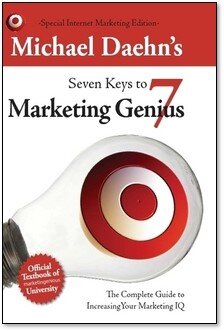7 Keys to Marketing Genius: Personal Selling One More Time
The following is an excerpt from The 7 Keys to Marketing Genius by Michael Daehn
This is the third time I implore you to value employees. Front-line salespeople and customer service representatives are the face of the company. This interaction is reciprocal. Not only does the salesperson communicate the marketing message of the company to the customer, but also customers directly relate their responses to the company representative.
I have had hundreds of interactions with customers in my years as a salesman. Customers would channel their complaints and compliments directly to me. I would often urge them to complete a response card and submit it to headquarters, particularly if I agreed with their comments. My fellow salespersons and I would sadly, yet honestly, explain that the company did not listen to us, but they might listen to them if they took the time to fill out a response card.
Smart marketers use this valuable, timely, and already paid for resource for gathering information. This is a win/win/win for the company and a win/win situation for the customer and salesperson. The company wins by gathering accurate data. The salespeople win because they feel valued and as if they are making a contribution. The company wins again because the salespeople are more committed to a company that cares and listens to what they have to say. The customers win because they are being heard and are getting the changes they want. The company wins a third time because the customers are happier and more committed to a continued relationship. Based on this reasoning, why would any company not invest in gathering information from its salespeople? Sadly, most companies do not know any better. Lucky for you, you read this book and can beat the socks off your competition.
I must admit I have ulterior motives for emphasizing the role of salespeople in the marketing process. The first reason is that I have spent so many years being ignored as a salesperson I desire to reform the industry and make personal selling an honorable and enjoyable profession. At the same time, I recognize there is a rational basis for taking this approach. The second reason is that I am tired of receiving sub-par service. I have worked very hard to be friendly, outgoing, and meet the needs of my customers, and I expect the same when I go shopping.
Once I had a customer remark to me that he appreciated my service and my knowledge about the products in my store. While I enjoyed the compliment, I did not feel as if I did anything extraordinary besides talk with the man and answer his questions. He said he was in the process of improving the customer service for an Internet software company he was consulting. I told him the names of some excellent books on customer service I recommend. He laughed and said that stuff was too advanced; these people just needed to learn some manners and how to be polite.
Who is to blame for poor customer service? Obviously, the salesperson needs to take responsibility for his or her actions and many salespeople do not care. But companies are also to blame for not spending time or resources on a vital component of the marketing process. They blow millions on television commercials in hopes that customers will visit their stores, yet only pay their salespeople minimum wage. Any customers that do shop based on the commercials will certainly be turned off by poor service. It is a strange paradox that in an age when service is a buzzword and everyone in business is talking about great customer service, good customer service is such a rarity.


